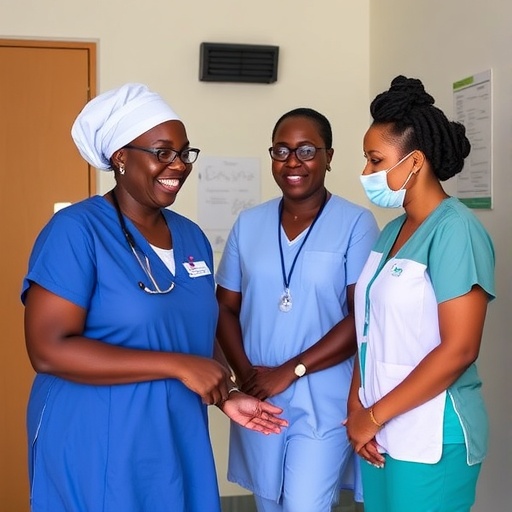PHILADELPHIA — A groundbreaking international collaborative effort aimed at strengthening nursing and midwifery across the Caribbean has been detailed in a newly published scientific article. The study, titled “Fostering International Collaborations to Inform Nursing and Midwifery Policy: A Caribbean Initiative,” was featured in the renowned International Nursing Review. Led by Dr. Eileen T. Lake of the University of Pennsylvania School of Nursing, this initiative represents a pioneering model for addressing complex health workforce challenges through coordinated, multinational strategies.
The Caribbean region faces unique and pressing difficulties in nursing and midwifery workforce development, including rampant migration of skilled professionals and critical shortages that severely impact healthcare delivery. This initiative was developed to directly support the Pan American Health Organization and World Health Organization’s strategic goals in enhancing workforce capacity and sustainability. By fostering a collaborative atmosphere among key stakeholders and utilizing robust data collection techniques, the partnership has established an innovative framework for policy-shaping and human resource management in healthcare.
Central to the success of this endeavor is the Pan American Collaborating Centers for Nursing and Midwifery (PANMCC) network, which integrates established academic and governmental bodies across the region. The leadership structure combines formalized governance with agile communication protocols to ensure a dynamic and responsive engagement with nursing leaders and policymakers. The partnership incorporated consistent, real-time interactions, which facilitated stakeholder buy-in and enhanced the quality and relevance of the survey instruments employed.
The core achievement of the initiative was the design, dissemination, and implementation of a comprehensive survey instrument that captured multifaceted data from 20 Caribbean countries. This dataset encompassed critical elements of education, practice environments, and policy frameworks, providing an unprecedented regional perspective on nursing and midwifery infrastructure. Remarkably, the survey achieved a 100% response rate from Chief Nursing Officers along with a 60% participation rate from directors of higher education institutions. Such engagement levels are notably rare in international research contexts and underscore the efficacy of the collaborative strategy.
The methodological rigor behind the survey development involved iterative design phases, extensive stakeholder consultation, and pilot testing to ensure validity and reliability across diverse Caribbean settings. The multidisciplinary team navigated logistical complexities related to regional heterogeneity, language diversity, and technological disparities. These challenges were overcome by leveraging the PANMCC network’s established trust and regional expertise, enabling data collection underpinned by both standardized metrics and locally contextualized content.
Beyond the immediate data acquisition and analysis, the initiative yielded several unexpected benefits. Chief among these was the reinforcement of the PANMCC network as a vibrant platform for continuous collaboration and knowledge exchange. Established connections were deepened, enabling participants to identify new avenues for joint research, policy advocacy, and capacity-building initiatives. Such network strengthening is poised to create sustainable impacts that transcend the initial scope of the project.
The implications of this work resonate deeply within the broader discourse on health human resources for health (HRH) in low-resource settings. By demonstrating that coordinated, region-wide data collection is feasible and effective, the study challenges prevailing assumptions about the limitations of resource-constrained environments. Moreover, the findings provide empirical backing for policy decisions aimed at mitigating workforce migration, optimizing educational pipelines, and enhancing regulatory frameworks across the Caribbean.
Technical aspects of the survey and data management included the adoption of electronic data capture tools customized for varying levels of technological infrastructure. Data security and confidentiality protocols were meticulously implemented to maintain ethical standards and comply with international research guidelines. Analytical approaches incorporated advanced statistical techniques to parse complex variables and model relationships between education, practice, and policy domains.
Dr. Eileen T. Lake, who also serves as the Associate Director of Penn Nursing’s Center for Health Outcomes and Policy Research, emphasized the significance of collaborative synergy in mobilizing such a large-scale endeavor. The project’s 18-month timeline involved 15 co-authors spanning six Pan American Collaborating Centers and PAHO staff, exemplifying the power of interinstitutional partnerships in advancing global health objectives.
From an educational standpoint, the collected data offer a granular understanding of nursing curricula, faculty capacity, and clinical training environments throughout the Caribbean region. These insights pave the way for harmonizing educational standards and fostering accreditation processes aligned with global best practices. Clinical practice assessments reveal critical gaps in workforce distribution, scope of practice, and professional development opportunities that inform targeted interventions.
Policy-wise, the initiative furnishes regional policymakers with robust evidence essential for crafting responsive legislation, resource allocation models, and retention strategies. Importantly, the study highlights how data-driven policymaking can mitigate the deleterious effects of workforce attrition and improve health outcomes for vulnerable Caribbean populations.
The University of Pennsylvania School of Nursing, which has maintained its position as the nation’s top-ranked nursing school, continues to pioneer research that bridges global health challenges and innovative solutions. Through initiatives like this Caribbean collaboration, Penn Nursing exemplifies how academic institutions can partner strategically with international organizations to translate research into actionable policy impact.
In sum, this landmark publication underscores the transformative potential of international collaborations in reshaping nursing and midwifery workforce landscapes. Its technical sophistication, methodological innovation, and collaborative essence set a new standard for regional health workforce development initiatives worldwide.
Article Title: Fostering International Collaborations to Inform Nursing and Midwifery Policy: A Caribbean Initiative
News Publication Date: August 20, 2025
Web References:
International Nursing Review Article DOI
University of Pennsylvania School of Nursing
Keywords: Nursing, Midwifery, Health workforce development, Caribbean health policy, Pan American Collaborating Centers, International collaboration, Health human resources




